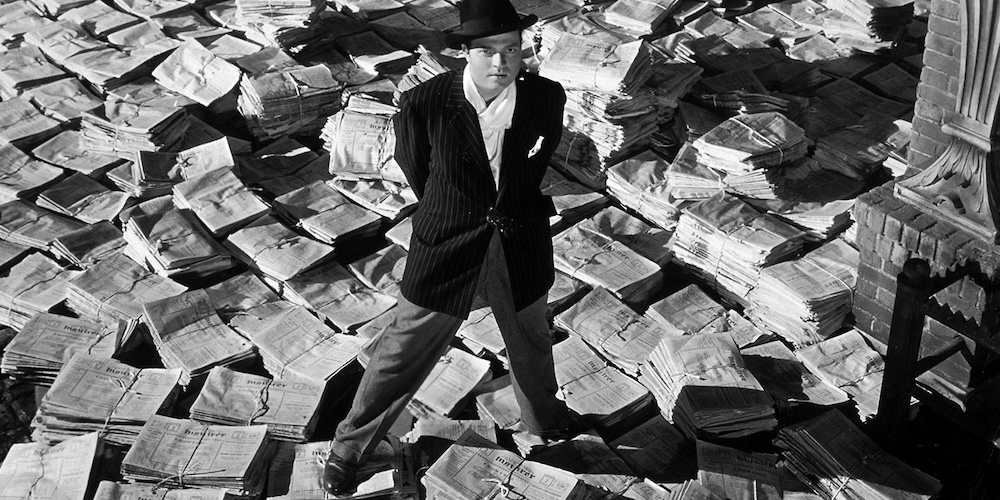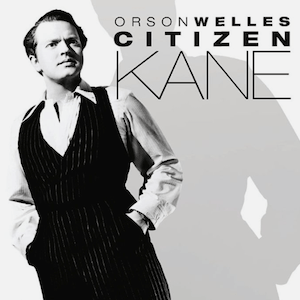
Given that I list films and the cinema as one of my major passions it is a bit of a mystery why there are some films that I haven’t seen. I don’t mean obscure, arty films that no one has seen, I mean ones that regularly turn up on those lists of best films of all time; I’ve never seen Vertigo, The Sound Of Music, Apocalypse Now, or any Charlie Chaplin film. There are more but I want to do more than just list my inadequacies as a cinephile! Fortunately, the nice people at The Light in New Brighton have started a Sunday matinée series of iconic films. Which is how I finally came to be watching Citizen Kane.
I’ve had a copy of it for ages but never actually got around to watching it. So when the opportunity to see it on the big screen I jumped at the chance…well, got a lift down and hobbled in. There’s no need, realistically, to worry about spoilers, the film came out in 1941 so it’s over eighty years old. Anyway, I think that there aren’t many people my age who haven’t seen it and it has been referenced in things ranging from Red Dwarf to Family Guy via Star Wars IX: The Final Jedi. The thing that struck me was that it is like a 40’s version of Succession right down to the threats from the big shots of the time threatening to sue!
Join the PERA (Personal Entertainment Research Assistant) waitlist.
The World's Most Indispensable Movie App
The RunPee app tells you the best times to
run & pee during a movie
so you don't miss the best scenes.
Download the RunPee app.
100% free (donation supported)
I Don’t Know Many People
So, for the benefit of all those people who have been living under a rock since the 2nd World War, what is Citizen Kane about? In short, it is the life story of a powerful media mogul; running from his childhood to the dissolution of his huge estate. The story is told using flashbacks based around the framework of a reporter investigating the meaning of Kane’s final word…Rosebud. That final word is the first spoken word of the film. The opening credits are unusually short, for the time, consisting of one card announcing that it is a Mercury production by Orson Welles followed by another just with the title.
There is bleak, dour music as we open onto a fence with a “No Trespassing” sign on it. There is then a wrought iron gate with a large “K” over it which fades into a cage with “Bengal Tiger” on a sign but two small monkeys sitting on a fence. In the background is a large building reminiscent of Mont St Michel with just one window illuminated. There is a pond with gondolas on it, an ornate bridge, a hole on a golf course, and a very fancy garden. All the time we are getting closer to the single lit window, until it fills the frame and the light goes out. Now we move inside the room and there is a blizzard. This turns out to be a snow globe in the hand of the man lying in the bed. His lips fill the screen and he says “Rosebud” and dies, letting the snow globe roll to the floor.
What people are saying
about the RunPee app.
September 23, 2023
This app is the best wingman for a movie goer, especially when you have to go. It even has a vibrating timer that is spot on for those 'go times' some of us need! There are many other features that are wonderful. It even lets you know when the kill scenes are coming up for the people and animals for those who may have sensitivities to that type of content. The staff go above and beyond!
View all reviews
Apple App Store | Google Play Store
Download RunPee app
I Know Too Many People
Then there is a faux newsreel announcing the death of Charles Foster Kane, giving highlights of his early days, his rise to power, and his personal life. It is after this that the newsreel’s producer sends reporter, Jerry Thompson (William Alland), to find out what was the significance of Rosebud. At the risk of spoilerage, Rosebud is seen in the early scene when the young Charles is, essentially, sold to a bank. His mother arranged for her son to be looked after by a bank in return for $50,000 a year for life. Given this is back in 1871, that is worth in excess of $1.25 million a year. Well, I love my kids but I’d think about it! Being realistic though, the film was made in 1941 and that would only be worth $60,245.90. Not quite in the same league but…
Looking back, we tend to think of Citizen Kane being made by someone at the peak of his craft taking the opportunity to show off his talents. However, Citizen Kane was Welles’ feature directing debut. He learnt most of his craft from repeated viewings of John Ford’s Stagecoach. Welles said “The first day I ever walked onto a set was my first day as a director. I’d learned whatever I knew in the projection room—from Ford. After dinner every night for about a month, I’d run Stagecoach, often with some different technician or department head from the studio, and ask questions. ‘How was this done?’ ‘Why was this done?’ It was like going to school.” Still…not bad for a first attempt.
Movie Grade: A+

Former teacher, lecturer, homelessness administrator, pharmacy dispenser now happily retired, happily married, and a very happy granddad. I live next to the Mersey but on the side Daniel Craig and Taron Egerton come from rather than the side the Beatles came from!






Now you need to watch RKO 281! Liev Schreiber and James Cromwell!! Mostly true…but it is Hollywood and more to the point, it’s about Hollywood, so some liberties are taken.
Comments are closed.